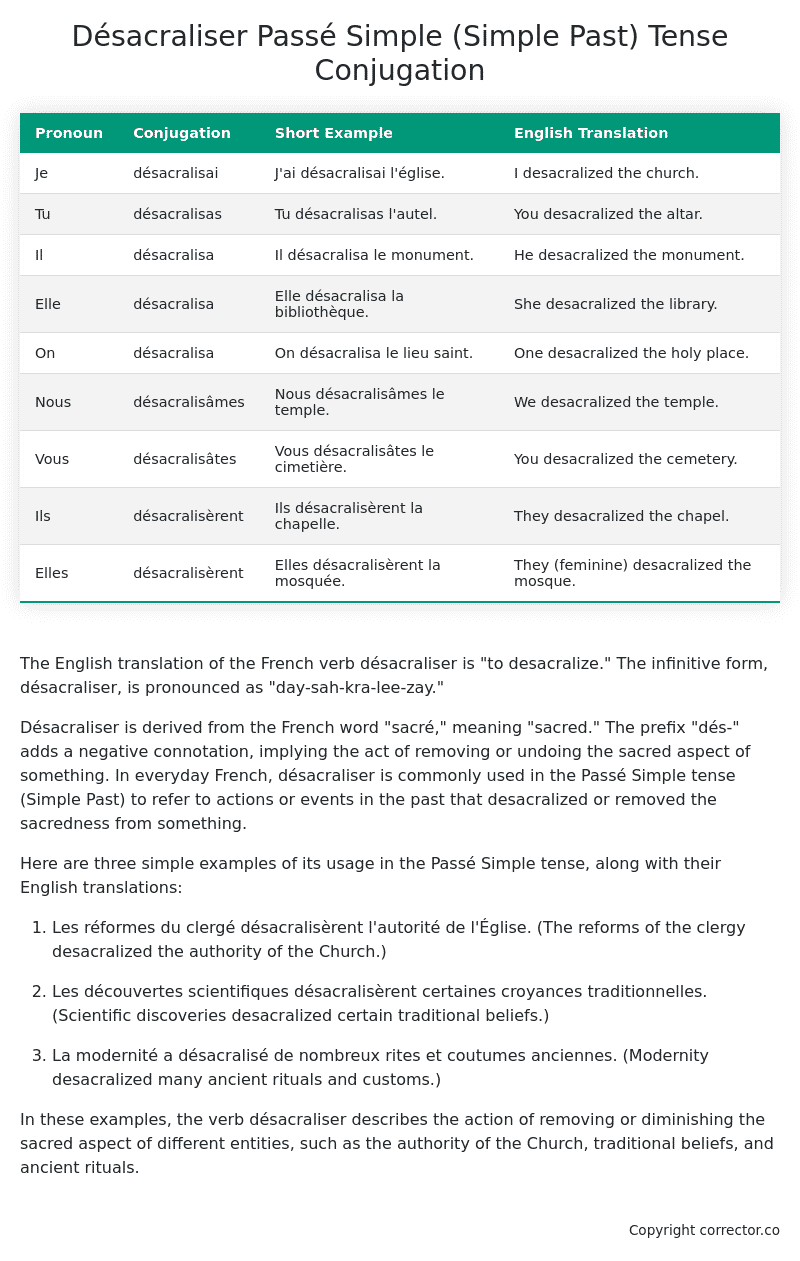Passé Simple (Simple Past) Tense Conjugation of the French Verb désacraliser
Introduction to the verb désacraliser
The English translation of the French verb désacraliser is “to desacralize.” The infinitive form, désacraliser, is pronounced as “day-sah-kra-lee-zay.”
Désacraliser is derived from the French word “sacré,” meaning “sacred.” The prefix “dés-” adds a negative connotation, implying the act of removing or undoing the sacred aspect of something. In everyday French, désacraliser is commonly used in the Passé Simple tense (Simple Past) to refer to actions or events in the past that desacralized or removed the sacredness from something.
Here are three simple examples of its usage in the Passé Simple tense, along with their English translations:
-
Les réformes du clergé désacralisèrent l’autorité de l’Église.
(The reforms of the clergy desacralized the authority of the Church.) -
Les découvertes scientifiques désacralisèrent certaines croyances traditionnelles.
(Scientific discoveries desacralized certain traditional beliefs.) -
La modernité a désacralisé de nombreux rites et coutumes anciennes.
(Modernity desacralized many ancient rituals and customs.)
In these examples, the verb désacraliser describes the action of removing or diminishing the sacred aspect of different entities, such as the authority of the Church, traditional beliefs, and ancient rituals.
Table of the Passé Simple (Simple Past) Tense Conjugation of désacraliser
| Pronoun | Conjugation | Short Example | English Translation |
|---|---|---|---|
| Je | désacralisai | J’ai désacralisai l’église. | I desacralized the church. |
| Tu | désacralisas | Tu désacralisas l’autel. | You desacralized the altar. |
| Il | désacralisa | Il désacralisa le monument. | He desacralized the monument. |
| Elle | désacralisa | Elle désacralisa la bibliothèque. | She desacralized the library. |
| On | désacralisa | On désacralisa le lieu saint. | One desacralized the holy place. |
| Nous | désacralisâmes | Nous désacralisâmes le temple. | We desacralized the temple. |
| Vous | désacralisâtes | Vous désacralisâtes le cimetière. | You desacralized the cemetery. |
| Ils | désacralisèrent | Ils désacralisèrent la chapelle. | They desacralized the chapel. |
| Elles | désacralisèrent | Elles désacralisèrent la mosquée. | They (feminine) desacralized the mosque. |
Other Conjugations for Désacraliser.
Le Present (Present Tense) Conjugation of the French Verb désacraliser
Imparfait (Imperfect) Tense Conjugation of the French Verb désacraliser
Passé Simple (Simple Past) Tense Conjugation of the French Verb désacraliser (You’re reading it right now!)
Passé Composé (Present Perfect) Tense Conjugation of the French Verb désacraliser
Futur Simple (Simple Future) Tense Conjugation of the French Verb désacraliser
Futur Proche (Near Future) Tense Conjugation of the French Verb désacraliser
Plus-que-parfait (Pluperfect) Tense Conjugation of the French Verb désacraliser
Passé Antérieur (Past Anterior) Tense Conjugation of the French Verb désacraliser
Futur Antérieur (Future Anterior) Tense Conjugation of the French Verb désacraliser
Subjonctif Présent (Subjunctive Present) Tense Conjugation of the French Verb désacraliser
Subjonctif Passé (Subjunctive Past) Tense Conjugation of the French Verb désacraliser
Subjonctif Imparfait (Subjunctive Imperfect) Tense Conjugation of the French Verb désacraliser
Conditionnel Présent (Conditional Present) Tense Conjugation of the French Verb désacraliser
Conditionnel Passé (Conditional Past) Tense Conjugation of the French Verb désacraliser
Conditionnel Passé II (Conditional Past II) Tense Conjugation of the French Verb désacraliser
L’impératif Présent (Imperative Present) Tense Conjugation of the French Verb désacraliser
L’impératif Passé (Imperative Past) Tense Conjugation of the French Verb désacraliser
L’infinitif Présent (Infinitive Present) Tense Conjugation of the French Verb désacraliser
L’infinitif Passé (Infinitive Past) Tense Conjugation of the French Verb désacraliser
Le Participe Présent (Present Participle) Tense Conjugation of the French Verb désacraliser
Le Participe Passé (Past Participle) Tense Conjugation of the French Verb désacraliser
Struggling with French verbs or the language in general? Why not use our free French Grammar Checker – no registration required!
Get a FREE Download Study Sheet of this Conjugation 🔥
Simply right click the image below, click “save image” and get your free reference for the désacraliser Passé Simple tense conjugation!

Désacraliser – About the French Passé Simple (Simple Past) Tense
Formation
Usage
Narration
Historical Context
Interactions with other tenses
Passé Composé
Imparfait
Conditional and Subjunctive
Summary
I hope you enjoyed this article on the verb désacraliser. Still in a learning mood? Check out another TOTALLY random French verb conjugation!


